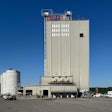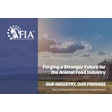
The Food Safety Modernization Act (FSMA) has changed the face of feed manufacturing. FSMA compliance inspections have been occurring at feed facilities for over a year now. During the recent Feed Production Education Program at the International Production & Processing Expo (IPPE) in Atlanta, the American Feed Industry Association (AFIA) reported that over 1,000 inspections occurred in 2019.
According to AFIA, in 2019, 964 FSMA Current Good Manufacturing Practice (CGMP) inspections were conducted domestically and 23 were conducted in foreign countries for a total of 987.
Also, in 2019, 221 domestic and 13 FSMA Hazard Analysis and Preventive Controls inspections were conducted for a total of 234.
Always be prepared
With that many inspections occurring, it’s only a matter of time before the inspector makes it to your facility. The best preparation for a FSMA inspection is knowledge of the regulations, says Gary Huddleston, AFIA’s director of feed manufacturing and regulatory affairs.
“Thorough knowledge of the regulations is the best preparation for an inspection,” he says. “Facility personnel should have a good understanding of the requirements and how their facility’s food safety plan meets those requirements.
“They should be able to effectively communicate how their food safety plan mitigates the risks of the identified hazards,” he continues. “Facility personnel should also be familiar with all company policies regarding inspections.”
As outlined in the regulations, every facility must designate a Preventive Controls Qualified Individual (PCQI). Huddleston notes one of the best sources of information and training for the PCQI is the FSPCA Preventive Controls for Animal Food course.
“The FSPCA course is the FDA-approved curriculum for PCQI training,” he says. “It’s highly recommended that every facility should have at least one employee take this course.”
AFIA offers these tips to facilities for BEFORE the inspection happens:
- Always be prepared for a regulatory inspection to occur, often unannounced. Notify management when inspectors arrive.
- Ask the inspector for appropriate identification. If his/her credentials and a federal Form FDA-482, “Notice of Inspection,” or equivalent state documentation, are not provided at the beginning of an inspection, notify management.
- Ask about the nature of the inspection: routine CGMP/BSE inspection, inspection pursuant to a complaint, sample collection or other.
- Assign a designated employee to accompany the inspector at all times. This company escort or assistant should take detailed notes — areas inspected, inspector’s questions and company’s responses, corrective action taken or promised.
- Establish a channel for company escorts to quickly contact management in case of “emergencies” during inspections.
- Make the inspector aware of all relevant safety and biosecurity procedures.
- Decide in advance whether corporate representatives will sign anything for FDA inspectors — some companies have a policy of not signing anything. If in doubt, notify management before signing.
- Maintain a professional, cooperative demeanor when dealing with inspectors.
Darrin Poole, corporate feed mill quality control manager with Sanderson Farms Inc., reminds facilities that the inspectors have a job to do. Unfortunately, an inspection will take time away from production activities.
“Understanding their role and how best to cooperate will lead to a beneficial inspection and, most of the time, a quicker but thorough inspection,” he says. “Understand that they are only there to follow set guidelines and rules and not to personally cause the mill problems.”
Poole says to be up front and answer questions, but politely challenge if necessary.
During the inspection
Knowing the rules and what’s expected is also key during the inspection.
“The first impression is always the most lasting impression,” says Poole. “How your mill is viewed upon arrival by the inspector can speak volumes about your programs.”
The facility should always be in top shape and present a well-attended and functioning facility, says Poole.
“If your mill is in disarray, then your programs are probably the same,” he says. Three areas to have organized, says Poole, is paperwork, procedures and plans.
“Even though FSMA has added to our paperwork, we should always have a grasp and knowledge of the exact location of each piece we need,” he says. “Readily available documents will make the inspection much easier for all parties involved.”
Other tips from AFIA for DURING the inspection include:
- Firms DO NOT need to start up or stop production lines at the inspector’s request. Inspections should be on a “business as usual” basis.
- Know what documents inspectors have the authority to review. FDA believes that if they have the right to review a document, they also have the right to photocopy it. Each firm should determine what (and how many) documents FDA may copy. Mark “CONFIDENTIAL” on proprietary documents provided to the inspector.
- If your company policy prohibits photography within the mill, do not allow inspectors to take photos. “If you allow photography, only an explosion-proof camera and flash equipment should be operated in animal food facilities,” says Huddleston. “Take duplicate photos for your files. An inspector should only request to take a photo for the purposes of documenting a regulatory issue.”
- If the inspector collects a sample, the firm should also collect and retain a duplicate sample.
- Always be honest with the inspector — but do not volunteer information. Provide only information to which inspectors are legally entitled. If in doubt, notify management.
Huddleston says one of the FDA’s main goals is to work cooperatively with industry to achieve voluntary compliance to the regulations.
“They are still in the mode of educating before they regulate,” he explains. “It’s certainly not beneficial to the industry’s overall goal of achieving food safety when the FDA and facilities don’t cooperate.”
Huddleston reminds facilities not to be confrontational. “Always cooperate,” he says. “But don’t show more than you need to. Always know what you have to share and what you don’t.”
Make sure your employees are comfortable discussing daily functions and how their duties relate to being a PCQI, says Poole.
“Everyone working in and around the production, manufacturing, processing and holding of animal food must be a QI,” says Poole. “This is someone who knows how to interpret their duties in association with personal hygiene and animal food safety. Their role is paramount in daily operations of a pristine functioning mill.”
After the inspector leaves
After the inspector leaves, facility personnel should immediately prepare and submit a detailed written report to management, which should include copies of any documentation provided to and from the inspector.
“Try to learn something,” says Poole. “At the end of the inspection, conclude with a summary of the inspection but more importantly, let the inspector know your thoughts about the inspection and appreciate his/her understanding and willingness to cooperate.”
Poole’s final piece of advice for surviving an inspection? “Know the rules,” he says. “I cannot stress this enough. If you know the rules, then you will follow the rules and set all required documentation accordingly. It makes the inspector’s job easier and your life less stressful.”
Huddleston agrees. “Inspectors can come any day you’re open for business,” he says. “An audit can be scary, but the more you know and the more you’re prepared, the less scary it is.”
The American Feed Industry Association is a great place to start to find guidance for FSMA compliance inspections. For more information, visit afia.org. ■
Checklist: Are you ready?
- Are you ready to tell your story? The point of contact at the facility that meets with the inspector needs to be able to describe how your facility operates and explain the food safety plan.
- Do you have a designated Preventive Controls Qualified Individual (PCQI) in place? Is their training documented?
- Do your employees know what is expected of them in the facility’s written food safety plan and are they doing it?
- Are your employees prepared to discuss their role in the food safety plan with an inspector?
- Are all the hazards for your type of facility or products produced accounted for in your facility’s hazard analysis?
- Is your corporate-based food safety plan adapted to your specific facility?
Information provided by the American Feed Industry Association, afia.org.



















